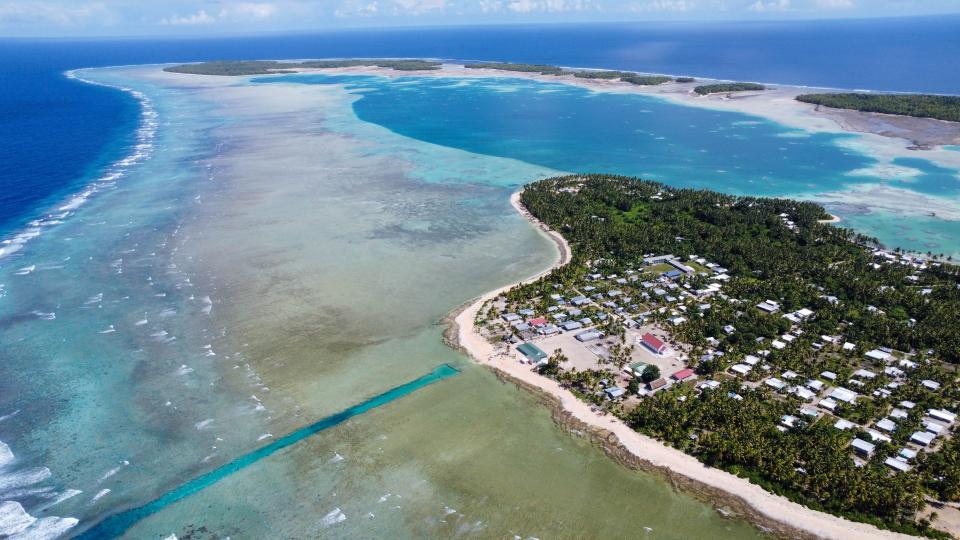Op-Ed by Dirk Wagener, UN Resident Coordinator for Fiji, Solomon Islands, Tonga, Tuvalu, and Vanuatu
When United Nations Secretary-General, António Guterres recently visited the Hahake coast in Tonga, he saw firsthand the devastating impacts of climate change and rising
sea levels on the Pacific.
Yet, amid this harsh reality, the people he met delivered a powerful message: “We are the guardians of the ocean. We are not passive observers of climate change—we are survivors. We will take action, using our traditional knowledge and working with our communities to confront these challenges.”
For thousands of years, the people of the Pacific have lived in harmony with the ocean and nature. But now, more than ever, the international community must rise to its responsibility. Empty promises are no longer an option. What is needed is decisive, urgent action.
At the Pacific Islands Forum Summit and in meetings with Pacific leaders, a unified voice emerged: “We are not small islands. We are large ocean states, united in our resolve and strength. This is an ocean of peace, where cooperation must prevail over competition.”
On the issue of climate change, Pacific leaders are not calling for incremental steps. They demand a bold vision and meaningful global action. “Enough with the talk—it’s time for action.”
As we celebrate UN Day this year, I reaffirm the UN’s unwavering commitment to the Pacific. We stand firmly with the region in the fight against climate change and call on the international community to act. The UN Secretary-General has made it abundantly clear: we are in full solidarity with the Pacific. We will work side by side with Pacific peoples and leaders to demand urgent action, urge the G20 to step up, and push for critical reforms in international institutions.
Sea-level rise poses the most immediate existential threat to the Pacific. By 2050, Funafuti, the capital of Tuvalu, could be submerged by daily tides. Sea levels in the region are rising twice as fast as the global average. More than 70 percent of key infrastructure sits within 500 meters of the coast, and over half of the population lives within a kilometer of the sea.
If current trends continue, entire population centres could become uninhabitable within 50 years. This is why the UN Secretary-General has issued an SOS on sea-level rise and why Pacific leaders are advocating for a dedicated session at the UN General Assembly to address this urgent crisis. As the people of Hahake and the entire Pacific fight for their future, the UN will stand with them on the global stage.
The impacts of sea level rise have already triggered unprecedented migration within and across Pacific nations. Over 50,000 Pacific Islanders are forced to migrate annually due to climate change. While the Pacific has a rich history of migration and regional solidarity, this new wave presents unique challenges. Those who are displaced and the communities receiving them are both under constant threat from rising seas.
Critical sectors are being affected. Nurses, teachers, doctors, workers, fishers, engineers, communities and young people are being displaced, creating significant gaps in essential services. Already, more than 1,000 nurses have left Fiji, Kiribati, Nauru, Tonga, and Tuvalu, adding immense pressure on local healthcare systems.
The UN is fully committed to support the Pacific in addressing this crisis. Sea-level rise touches every aspect of life in the Pacific. Beyond climate change, the UN is working hand-in-hand with the region to advance the achievement of the Sustainable Development Goals (SDGs) and uplift millions from poverty and inadequate living conditions.
However, the global progress on the SDGs is concerning. Only 17 percent of the SDG targets are on track, while another 17 percent are regressing. The rest are seeing limited or stagnant progress. We are far from achieving our collective goals.
The UN is equally committed to promoting social cohesion and peacebuilding across the Pacific. While the region remains largely peaceful, social cohesion and sustained peace cannot be taken for granted. Past conflicts have led to violence and fragmentation in some areas. We must work together to ensure this does not happen again. The UN remains dedicated to strengthening social cohesion, preserving democratic spaces, and safeguarding human rights.
On this UN Day, I reaffirm the UN’s complete solidarity with the Pacific. We will stand by your side on the climate change frontlines, work tirelessly to advance the SDGs and regional goals, and support a future that is inclusive of women and youth. Together, we can build a stronger, more resilient Pacific.
Happy UN Day to all – let us walk together toward a brighter and sustainable future. It is
in our reach.














